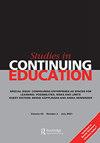First-line managers’ practices and learning in unpredictable work within elderly care
IF 1.9
4区 教育学
Q2 EDUCATION & EDUCATIONAL RESEARCH
引用次数: 2
Abstract
ABSTRACT Despite the number of studies confirming a high degree of unpredictability in managerial work, little is still known about how managers’ workplace learning happens within organisations in such circumstances. This paper therefore aims to contribute knowledge about managers’ learning in managerial practice when work is unpredictable, by investigating how first-line managers deal with unforeseen situations and how they learn in such circumstances in everyday work. Data was collected via qualitative interviews with 40 first-line managers in Swedish elderly care. By using a theoretical framework based on practice and workplace learning theories, the paper analyses how managers address unpredictability in work through three embedded practices: maintaining, modifying and inventing. The paper goes beyond research on leadership training and leadership development by contributing knowledge about the everyday learning of first-line managers when their work is unpredictable. The unpredictable managerial work does not always create chaos; instead, there are very orderly ways of learning from dealing with unforeseen situations. The unforeseen is not as unpredictable as it might seem in managerial work. On the other hand, that which is not yet known calls for an inventing practice, which results in managers learning to take new paths that can create new practices.一线管理人员在养老领域不可预测工作中的实践和学习
摘要尽管大量研究证实了管理工作的高度不可预测性,但对于在这种情况下,管理者的工作场所学习是如何在组织中发生的,人们仍然知之甚少。因此,本文旨在通过调查一线管理者如何处理不可预见的情况,以及他们在日常工作中如何在这种情况下学习,为管理实践中管理者在工作不可预测时的学习贡献知识。数据是通过对40名瑞典老年护理一线管理人员的定性访谈收集的。本文运用基于实践和工作场所学习理论的理论框架,分析了管理者如何通过三种嵌入实践来解决工作中的不可预测性:维护、修改和发明。这篇论文超越了对领导力培训和领导力发展的研究,贡献了一线管理者在工作不可预测时的日常学习知识。不可预测的管理工作并不总是制造混乱;相反,在处理不可预见的情况时,有非常有序的学习方法。不可预见的事情并不像管理工作中看起来那么不可预测。另一方面,尚不为人所知的是需要创新实践,这导致管理者学会走新的道路,创造新的实践。
本文章由计算机程序翻译,如有差异,请以英文原文为准。
求助全文
约1分钟内获得全文
求助全文
来源期刊

Studies in Continuing Education
EDUCATION & EDUCATIONAL RESEARCH-
CiteScore
4.70
自引率
6.70%
发文量
22
期刊介绍:
Studies in Continuing Education is a scholarly journal concerned with all aspects of continuing, professional and lifelong learning. It aims to be of special interest to those involved in: •continuing professional education •adults learning •staff development •training and development •human resource development
 求助内容:
求助内容: 应助结果提醒方式:
应助结果提醒方式:


